#say it in the reblogs/replies
Explore tagged Tumblr posts
Text
From scrolling on Pinterest, I’ve discovered some things that I have questions about:
-> where does the whole “Keith is obsessed with moth man” thing come from
-> why is shiro referred to as a six-year-old
-> why did you guys decide to call keith’s dad “Texas Kogane” (this is actually funny so it’s not necessarily a question but more of an amused curiosity)
-> is Lance actually cuban or is that just a really popular headcanon/appeared once in a famous fic and everyone started using it
-> what is “shaladin” ???
#I have more but I feel like those are gonna be big spoiler territory#I will remain blissfully unaware 🙏😌#for my own sanity#laura’s first vld#vld#voltron#voltron legendary defender#seriously what is shaladin#this is genuinely me asking for answers#say it in the reblogs/replies#please#edit: the “spoiler territory” ones were “who is krolia” and “is shiro actually a clone” both of which were answered by watching lol
97 notes
·
View notes
Note
I loved your drawing(and I love your style in general) with Leia in your recent post! If/when you have time can we see more of her in your style? I get so happy whenever I actually see people mention/talk about her and she’s not just forgotten because we didn’t get to see much of her. 😭
thank you! 💙💙💙 Leia/Leah/Lea/whatever is fascinating to me. she is the ultimate unknown. what was she like? how involved (or even aware of any details of the invasion) was she? Silver's basically a physical carbon copy of his biodad, so what did he get from her? like, I understand why the two of them kind of have to stay as these super vague and mysterious figures -- the whole point of them is that their story ended 400+ years ago and they're not really relevant anymore (and. well. the more that gets explained about them, the less that can just kinda be handwaved as "oh the politics were Very Messy") (we can sit here and theorize all day but let us acknowledge that, ultimately, canon gave us almost nothing about them post-Meleanor and we'd just be making things up). I do still wonder about her though! RIP Lea, we never knew you and we probably never will.

actually you know what, as long as we're here, I think I WILL go ahead and just make some stuff up about what Silver might've inherited from her instead.

#art#twisted wonderland#twisted wonderland spoilers#twisted wonderland episode 7 spoilers#twisted wonderland book 7 spoilers#twisted wonderland episode 7 part 13 spoilers#twisted wonderland book 7 part 13 spoilers#there may be answers somewhere that i just forgot about so uhhh if so#whoops ( ᐛ )#having one of those art days where chances are good i'm just gonna wake up and throw this post out the window so be warned#but yeah idk. i've talked before about the parallels between silver and dawnatello and how i see him as basically bad end silver#he chose the easy option that let him stay loyal and fulfill the obligation he felt to his adoptive family#he knew it wasn't right and that he was being manipulated but he went along with it anyway until it was too late#i think he ultimately had a good heart but my man folded under the slightest bit of social pressure like a wet mcmuffin#so while i'm continuing to make things up out of whole cloth i wanna say that by contrast#lea never had a chance to do shit but if she had i like to think she would've had a spine like galvanized steel#like just personally i don't think she knew much about what the silver owls were actually doing#seriously does henrik seem like the kind of person who would tell her shit about anything#i think he basically took advantage of their dad's failing health to go off and be a warmonger#and if he thought about lea at all it was to be like :) you stay here and do boring domestic princess stuff#while i tell your husband to Do It For Her#i mean this is 100% me writing baseless fanfic here#i just think it'd be fun if the part of silver that was IMMEDIATELY like 'actually no. we aren't doing this.' might've come from her#she just never got a chance to show it#(it didn't seem to come from the knight is all i'm saying)#lilia might've given silver a billion complexes but at least he raised him to do the right thing#man someone left a reply or reblog on an older post and i cannot find it so i apologize for the lack of credit BUT they pointed out#that one of the big differences between silver and the knight is that the knight's family did not really seem to like him very much and lik#yeah i think so. lea might've been the exception there for him.#rip ma'am we'll never know if you deserved better or not
2K notes
·
View notes
Text
6 Things I Am No Longer Apologizing For As An Autistic Person







Neurodivergent_lou
#autism#actually autistic#things people can stop apologizing for#asking for accommodations#ask questions to clarify answers#saying “no”#doing things at a slower pace#need time to relax#being slow to replying to messages#neurodivergence#neurodiversity#actually neurodivergent#feel free to share/reblog#neurodivergent_lou (Facebook)
747 notes
·
View notes
Text
roleplay blogs - if you post a character headcanon or a graphic and you don't want non rp blogs to reblog it, you can click the little gear at the top right of your post and change the "who can reblog?" from anyone to no one. they can still like it if they find the post, but now they can't flood your notifications with reblogs and cause a serious headache. hope that helps!
#and for any non rp blogs reading this: please don't swarm a roleplayer's blog with notifications#that makes it really hard for them to find the replies they owe#if they say “non rp blogs do not reblog” or “personals” do not reblog#“personals” means non rp blog#rp psa#roleplay psa#rpc psa#roleplay tips#roleplay advice#roleplay help
166 notes
·
View notes
Text

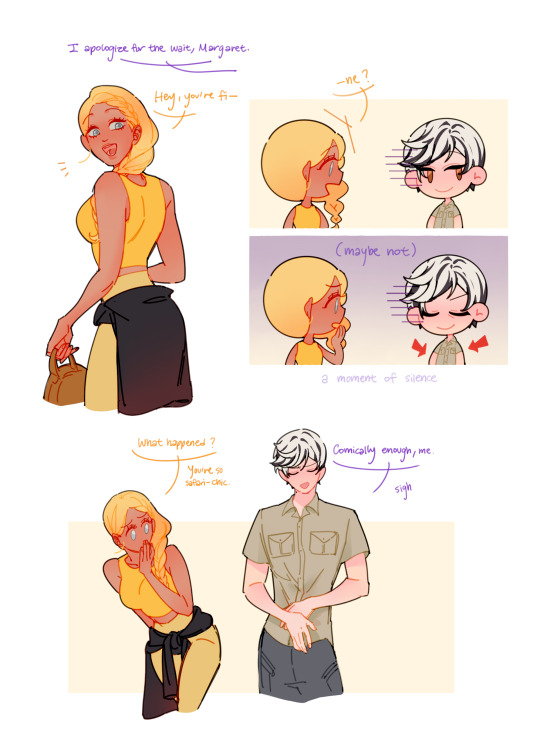

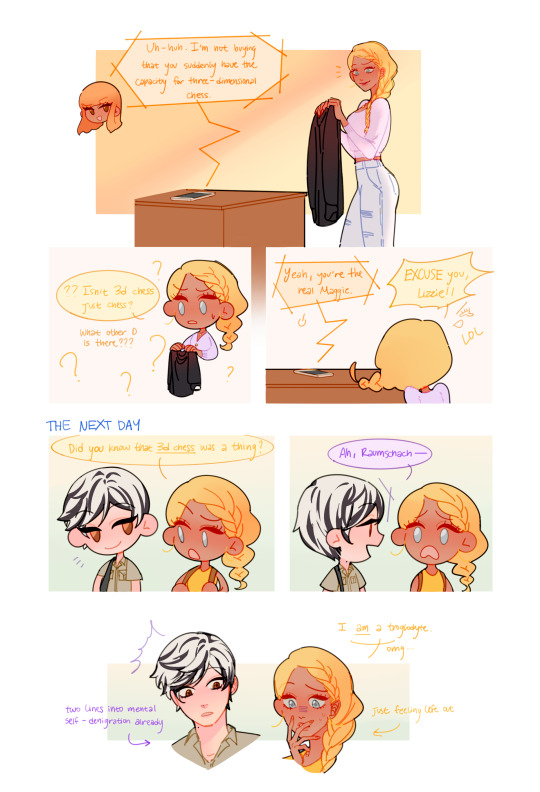
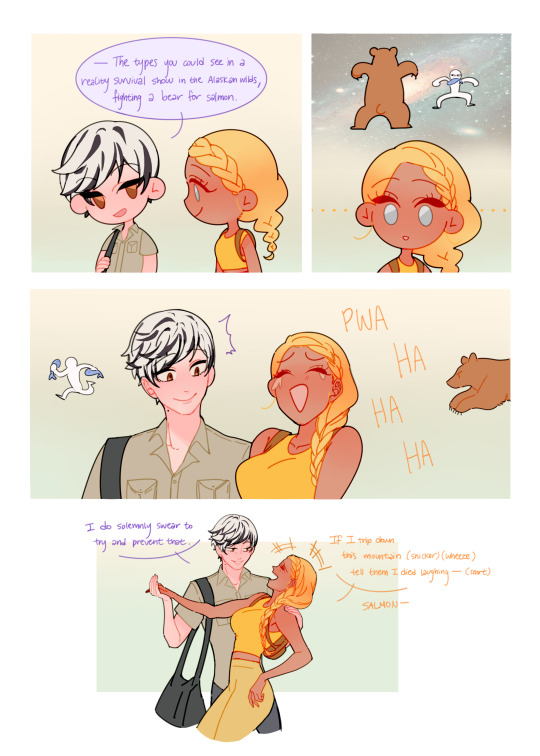
a spot of mountaineering before the new year 🏔️
#akia art#our life#olba#baxter ward#olba mc#this was my favorite moment waha#i'd love to draw more scenes but idk if i can brave the gauntlet that is baxter's hair again LOL#also not sure what the etiquette is re: replying to reblog comments but i wanna say TY#i read them all 🥹🫶 u guys are lovely#margaret montgomery
355 notes
·
View notes
Text
so i just saw a post from an autism/adhd tumblr about adult thumb sucking as stimming but as someone who's never really done it the only thing i knew about it was a girl at secondary school who was made to stop because she'd had braces and it would make her teeth wonky again
so now i hc that snape has crooked teeth because he sucked his thumb well into adulthood to self-soothe in private bc obviously never did so in public since childhood because he was teased enough already
#autistic snape#autistic severus snape#snautistic sneverus snape#snautism#pro snape#severus snape#snape#snape fandom#professor snape#pro severus snape#snape fanart#also to whoever reblogged/replied to some older post saying they hoped my assessment went well thank u#it did#i was diagnosed shortly before christmas :P#merry christmas. have autism#snape headcanon#also reminds me of a really good snape-in-therapy age regression fic i read once#i should see if that's updated#snapedom
81 notes
·
View notes
Text
Question for my Elden Ring fellows! Which place(s)* in the game would you consider suitable for a date?
*specific locations/landmarks/parts of the map (ie not entire regions)
#yes this is for a fic but now that I'm asking I'm also genuinely curious about what people r gonna say!#don't be shy there are no wrong answers 😤#elden ring#oh oh! feel free to reblog and add screenshots from your game if you have some! or just replies are also good ^^
32 notes
·
View notes
Text
i figured since im not rlly posting anything art wise and as thanks to yall supporting me, i wanted to boost some of ur posts! so if u got a open comm post, unsold adopts, or just some art u want more eyes on, link em below and ill reblog a few :3
#make sure you link a post i can reblog#or if u dont have one ig u can reply and maybe ppl will check it out?#saturn says
41 notes
·
View notes
Text
im gonna start posting fanfic recs btw whenever i find good ones. both here and my (awfully barren) 18+ account. because there are so many good fics out there with so few hits and fewer kudos and sometimes no comments period and it SUCKS because i REALLY LIKE THEM A LOT.. and i hope that by linking them here and yelling at everyone to COMMENT DAMMIT they might actually do it
seriously though any comment means a lot. most people who read a fic don’t even give a kudos. even if the fic wasn’t top tier, if you didn’t dislike it, hand over some kudos!! and if you liked it, comment!!!! even if the comment is one singular heart emoji it will be appreciated. if the comment just says “great fic!” the author will be happy. your comment doesn’t have to be this long winded gushing or analysis.
so many authors quit writing or lose motivation because the comments are few and far in between or just sometimes nonexistent. trust me when i say authors don’t care about how long or cool or smart sounding your comment is i promise!!!
i hope that mmmaybe recommending fics and telling people to comment might help fics i really like get more support maybe. and i, points at you reading this, hope that you will listen!!!at least a little….at least sum kudos….
#if u have the ability to reply to my reblog saying how much you loved the fic i recommended comment on the fic itself so the author can see!#especially since the rise of ai writing and seeing ai fics out there can be disheartening#make sure you let your writers know you appreciate them#you never know they might one day write a sequel bc your comment touched them#or might get the motivation to make more works.#(but don’t just comment bc you expect something out of it btw. sometimes the author might be too intimidated to reply ive seen that before)#im a huge yapper. if you can’t tell. lmfao.#and i mostly comment on guest. like 99% of the time because the fics are either really embarrassing#or i get nervous about them knowing me/finding my tumblr and thinking im cringw#bc i admire authors so much. and I get that nervousness! given I experience it!!! but guest mode EXISTS!!! most work allows you to comment#on guest mode!! the author CANT see the email you use for it!!! the only reason they even ask is to give you notifs if theres a reply to it!#a comment is still a comment even if on guest or an alt or your main#even if the fic is embarrassing shameful depraved smut you can log out and comment on guest. even if it’s embarrassing#because the author still worked HARD. it’s so hard to write. people don’t give enough credit to fic authors who do it for free#i had an account (now super abandoned) that had over 400k words. and that didn’t include wips#i reallg do struggle to write because i took a break for so long!!! i can write but not nearly as much as I used to!!! and it sucks!!!#support your authors guys. 1k words is an hour for the first draft at MINIMUM and another hour for revision and editing. and people get#pissy if a fic chapter is less than 3-4k words for some reason. that’s 6-8 hours of work at MINIMUM. likely so much more because there’s#also plotting and brainstorming and So. Much. Editing. stressing out over words and sentence structure. it takes so much time out of your#day. the only oneshot i have posted on this account is 2460 words. and it took me SEVEN HOURS#seven hours!!!! that’s a lot!!!! and for authors that have school or demanding jobs that kind of time is hard to come by!!!!!#and I hope i have convinced at least one of you to listen and go okay you know what. i will. because even if it’s a silly comment it’s loved#tldr support your local fanfic authors of you will be so stabbed. by me#fanfiction#fanfic#archive of our own#ao3#comment on fics#wick fic recs#that’s the rec tag btw. wow custom tags AGAIN i know. im doing what i thought i never would
84 notes
·
View notes
Text
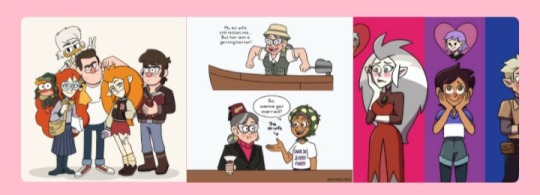
The Bi drawing is becoming one of my most popular posts just because of the discourse still going on under it I'm going to kms 🙃
#i want so badly to just delete every reply and reblog related to the harassment on that post#or just delete the post entirely#but i think i should leave all that stuff up just in case#since people keep trying to say im lying when this kinda stuff happens#lying for what? sympathy?#i don't getting any#ive just gotten people blaming me for it or saying the harasser is right
120 notes
·
View notes
Text
EXCITING NEWS!!!
The keychain I've ordered arrived today!
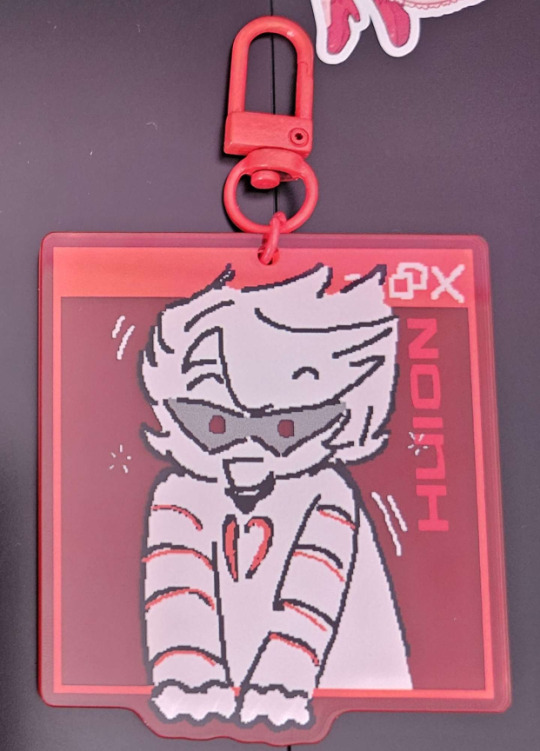
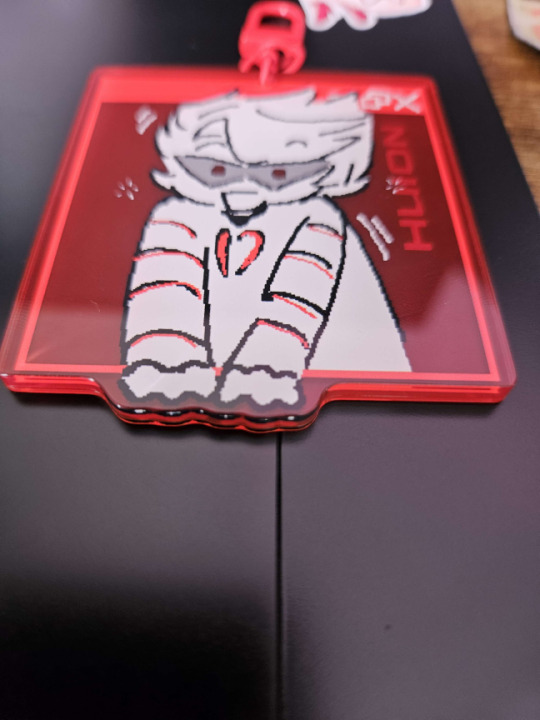
I put them onto my tablet to show off the tranparency but AAA! HE'S HERE AND REAL!
Are you purrhaps interested in getting one of these bad boys for yourself >:3c? it would make me so so so sooo very happy if you would go through and fill out this interest check! Thank you!
#and I know I didn't add the firey text but still please reblog mwa mwa kisses#fan merch#fanart#homestuck fanart#homestuck#<3#lil hal#hal strider#hal#lil hal fanart#hal strider fanart#there's an option in the survey for you to suggest other characters... just saying#bats my eyelashes at you all pretty like#I cannot for the life of me get the video of him spinning around to work on pc so I'll try to add it in the replies >_>
41 notes
·
View notes
Text
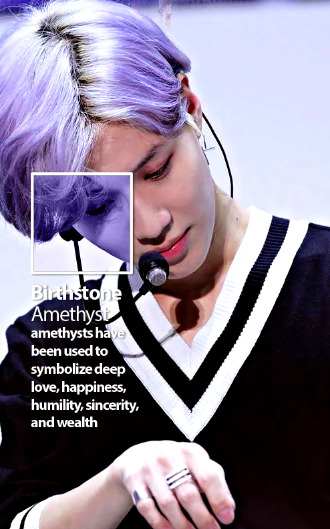





Happy Birthday @acebytaemin ˚ʚ♡ɞ˚
#I hope you have a very nice day! and eat something yummy! and have good fun!#and that everyone is lovely to you just as you are always very lovely and very kind#thanks for all the funny and interesting and cute tags you leave on my posts! and everyone elses posts too#you are like the dreamboat of tumblr users because you're so fun and you reblog posts and chat and reply so 💜 my offering#i think i was gonna say something else but i forgot....#Oh! i know skz is why we follow each other but I couldn't pass up those taemin shots#Oh and also! as I told Ash on Ash's bday post: violets are also apparently representative of wlw love so... isnt that fun 😇#acebytaemin#birthdate analysis#jesskz#taemin#lee know
44 notes
·
View notes
Text
i'm genuinely curious, what makes you reblog vs like a post?
#like what makes you say “oh i want this on my blog” or “i don't like it enough to put it there”#i guess what i'm asking is what is the it factor for posts for you lol#i know we keep going on and on about the likes vs reblog ratio (which is fucked but i digress)#i remember back in the day pale blogs were all the rage so it made sense they wouldn't reblog colorful gifs/pictures but now?#i'm just curious why some people only like and never reblog or other people reblog but never like#tell me!! i wanna know#reblog and tell me in the tags or reply idc#reblog for bigger sample size maybe as well#voted most talkative
27 notes
·
View notes
Note
tbh....some of these i'm like. 'they'd swear to the dark and transfer from their first ajah to the black ajah actually'
There is no war in Ba Sing Se.
There are no Darkfriends in the White Tower. That is a vile slander made up by the Tower's enemies. 😌
#wot#wheel of time#wot on prime#wheel of time on prime#to be honest I almost included a black ajah option but I figured it would skew the votes on some since the public ajah *also* informs#a character's personality a lot#and you might get a scenario where say black and green split the vote share and you get o-ren ishii as a brown#side note to self: add o-ren ishii to the que#anyways if you think someone would be secretly black ajah you should 100% make the case in the tags/reblogs/replies#I think it's a fascinating discussion to have#about which characters would and would not be willing to go over to the shadow#the wheel of time
29 notes
·
View notes
Text
People in my replies calling Bones racists again 🙄
Reckon they think Spock's racist too or do they just save it for the character they've decided to simplify into a one note hollowed out version of what canon had?
#at least have the balls to reblog and say it on your own blog too lol#but nooo in my replies just for me to read#absolute asshole approach to fandom etiquette#too cowardly to say it out loud so they just whisper it to me. someone who rather obviously likes Bones. go away.
25 notes
·
View notes
Text
it's with a heavy heart that i say that nathan prescott liked death grips before they were cool
#he discovered them from tumblr circa 2012. you might say that nathan is too much of an aggro bro to have a tumblr#but i counter with that Every artsy fartsy kid had a tumblr back then. yes even egregious cis men#his tumblr was a portfolio one where he also reblogged other peoples photography.#he unfortunately frequented peoples ask boxes/messages with hate mail tho and everyone replying would be like#“what the fuck your blog is so weird ew get away from me”#i have such a specific vision for everyones tumblr blogs but no tumblr old heads to confide in with this knowledge#nathan prescott#life is strange
16 notes
·
View notes